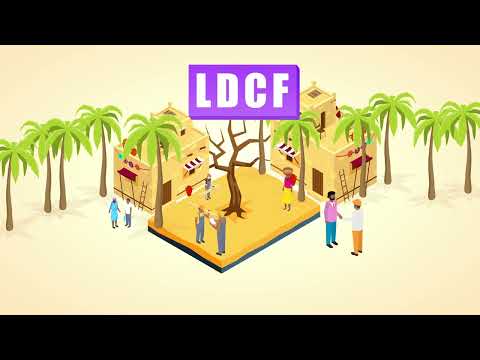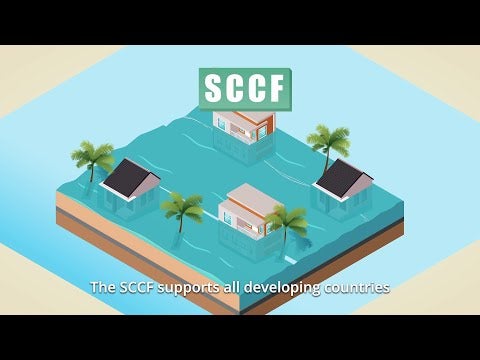Main Issue
International efforts to address climate change adaptation are intensifying to build resilience to rising seas, higher temperatures, worsening droughts, intensifying floods, and other impacts that are affecting water resources, crop yields, and the health of people and ecosystems. Adaptation measures are urgently needed to safeguard development gains and to address the needs of developing countries which are especially exposed to climate change impacts.
The GEF family of funds works with Least Developed Countries (LDCs) and Small Island Developing States (SIDS) – those most at risk from climate change – to build their climate resilience. By working with national governments to develop and implement climate resilient policies and plans, build capacity, promote innovation, and unlock financial flows, the GEF is ensuring that LDCs and SIDS are able to adapt to our changing climate, while maintaining and continuing their sustainable development.
GEF Climate Change Adaptation Funds

Least Developed Countries Fund
The GEF’s adaptation support in the Least Developed Countries (LDCs) is delivered through the Least Developed Countries Fund (LDCF). The LDCF is the only multilateral fund that focuses exclusively on the unique climate adaptation challenges of LDCs and is embraced by LDCs as their own. The fund has a strong track record of supporting LDCs to address adaptation priorities over more than two decades. It delivers targeted support to the world’s most vulnerable countries, and their people and ecosystems.

Special Climate Change Fund
The Special Climate Change Fund (SCCF), one of the world’s first multilateral climate adaptation finance instruments, was created at the 2001 Conference of the Parties to the United Nations Framework Convention on Climate Change (UNFCCC) to help vulnerable nations in addressing these negative impacts of climate change.
Featured Content
What We Do
The Global Environment Facility was the first global source of funds for climate adaptation, and continues to play a leading role in strengthening the resilience of developing countries as an operating entity of the financial mechanism to the United Nations Framework Convention on Climate Change (UNFCCC).
It channels support for climate adaptation mainly through the Least Developed Countries Fund (LDCF) and the Special Climate Change Fund (SCCF). These two funds have an important role of serving the Paris Agreement, which has established a global goal on adaptation to enhance adaptive capacity, strengthen resilience, and reduce vulnerability to climate change.
The GEF’s approach to adaptation is based on the recognition that climate change affects all aspects of human, social, and economic development. The GEF has supported the integration of adaptation measures into development plans, policies, programs, and projects at the regional, national, sub-national, and local levels. Innovation, partnership, and gender equality are also part of the GEF’s approach to adaptation and resilience support.
The LDCF and SCCF have supported countries in their response to the COVID-19 crisis by enabling them to invest in enhancing resilience, creating buffers, and applying nature-based solutions. Initiatives supported by the two funds are helping countries strengthen income diversification, build supply chain resilience, reinforce local food security, and improve access to basic services, and target support to critical ecosystems.
The programming strategy for the LDCF and SCCF for GEF-8, which runs from July 2022 to June 2026 was endorsed at the June 2022 LDCF/SCCF Council meeting and launched in July 2022.
The strategy aims to provide targeted support to countries in three priority areas i) scaling up finance; ii) strengthening innovation and private sector engagement; and iii) fostering partnership for inclusion and a whole-of-society approach. The two funds seek to enhance partnership with vulnerable groups such as women and girls, youth, Indigenous Peoples, and local communities, to facilitate inclusion and locally-led action for transformational adaptation outcomes.
The strategy includes themes of particular interest for the LDCF and SCCF in GEF-8 that will build on areas of high impact, articulated national priorities, and the experience of the two funds, with potential for trans-disciplinary interventions that can catalyze change and enable systemic shifts. These themes also recognize the interdependency between human well-being and a healthy environment, well-aligned with the framework of 'Healthy Planet, Healthy People' proposed in the GEF-8 programming directions of the GEF Trust Fund.
Theme 1: Agriculture, Food Security, and Health
Agriculture, food security, and health will be important themes in GEF-8 with a heightened focus on community well-being. Programs and projects will support adaptation in the context of food security and health, aligned with the concept of agroecological transformation, such as through improvements in ecosystem management, food value chains, and livelihoods.
Theme 2: Water
Climate change is characterized by some to manifest itself primarily through changes in the water cycle. For human societies, water is needed for residential use including consumption and sanitation, as well as agricultural, industrial, power generation, and other uses. However, climate change impacts freshwater availability which also has implications for fragility and resource conflict, a trend that is expected to continue. Thus, freshwater quality and quantity will be an important aspect of the GEF’s adaptation program via integrated water resources management interventions that mainstream climate resilience.
Theme 3: Nature-based Solutions
Natured-based solutions (NBS) has been a cornerstone of the GEF’s adaptation portfolio since inception. With high potential to deliver adaptation as well as a range of additional benefits contributing to resilience of people and ecosystems, and for biodiversity and climate change mitigation, NBS merits additional emphasis in the GEF-8 period as a means of effecting adaptation.
Theme 4: Early Warning and Climate Information Systems
Early warning and climate information systems were funded in GEF-7, and will continue to be so under the programming strategy for the LDCF and SCCF for GEF-8, through investments in automated weather systems and their operations and maintenance; agro-hydrometeorological forecasting and information; related institutional capacity building; and ‘last-mile’ technologies for user groups.
Results
Since 2001, the GEF has provided more than $2 billion in grant financing and mobilized more than $10 billion from other sources for approximately 488 adaptation projects in the Least Developed Countries (LDCs) and Small Island Developing States (SIDS) and other vulnerable developing countries. These projects are working to directly reduce the vulnerability of around 70 million people.
GEF-supported adaptation projects have also backed improved management of more than 14 million hectares of productive and natural landscapes so they can more effectively withstand the effects of climate change. Climate adaptation investments from the GEF have also prepared the ground for large-scale climate adaptation through the provision of different forms of adaptation training to at least 2.3 million people.
They will also contribute towards the development or strengthening of over 3,500 policies, plans, and processes to identify, prioritize, and integrate adaptation strategies across the most vulnerable sectors in developing countries.
Building Capacity for Adaptation
The GEF-8 strategy introduces three dedicated programs which include (i) Communications and visibility enhancement; (ii) Outreach and capacity support; and (iii) Organizational learning and coordination to enhance the impact and effectiveness of the LDCF and SCCF. The program on ‘Outreach and capacity support’ aims at ensuring that all 46 LDCs have enhanced support to access the LDCF during the GEF-8 period, given that the initial country allocation has doubled to $20 million per LDC relative to the GEF-7 period.
In this context, the GEF Secretariat, in collaboration with the LDC Group under the auspices of the Senegal Chairmanship, has been organizing a series of regional programming and strategy workshops in Francophone Africa, Anglophone Africa, Asia, the Pacific, and the Caribbean to address some of the key challenges faced by LDCs and SIDS in accessing finance for their national climate change adaptation programs.
The objective of the workshops is to advance the LDCF and SCCF programming and build participants’ capacity to strengthen their skills and knowledge in the selection, design, and implementation of impactful national climate change adaptation projects. In addition, the workshops provide participants with information and tools that will assist them in translating those adaptation needs to GEF concept note templates, and to facilitate access to suitable climate finance from other sources.
Workshops
- January-June 2024: Sub-regional Programming and Strategy Workshop for non-LDCs SIDS (tbc)
- October 2-5, 2023: Sub-regional Programming and Strategy Workshop for LDCs (Ethiopia)
- September 26-29, 2023: Regional Programming and Strategy Workshop for Pacific LDCs (Solomon Islands)
- September 19-22, 2023: Regional Programming and Strategy Workshop for Asian LDCs (Cambodia)
- April 24-27, 2023: Workshop for Francophone LDCs (Senegal)
Looking Ahead
The LDCF and SCCF are continuing to provide nimble support to enable LDCs and SIDS countries to address climate change adaptation needs in tandem with their efforts to response to other external shocks such as the COVID-19 crisis to supportive transformative adaptation and resilience.
The GEF has been collaborating closely with the Green Climate Fund (GCF) through the Long-Term Vision (LTV) of Complementarity, launched in 2021 with the engagement of the GEF Council and GCF Board. The LTV activities include identification and partnership on major initiatives, such as the new phase of the Great Green Wall, building on successful GEF-GCF investments, the facilitation of national investment planning in five countries, and joint communications efforts. The two institutions also commissioned and released a third party comparative analysis of processes and policies of the GEF and the GCF to foster complementarity and coherence.
Building on this partnership, increased collaboration with other climate funds is being fostered to continue advancing the global climate adaptation objectives.
The GEF is engaged in the UNFCCC process to help raise the level of climate ambition and support ongoing adaptation action and progress, responding directly to the adaptation specific COP guidance. Leading up to COP28, the GEF has actively participated in the Global Stocktake process and the workstreams under the Glasgow-Sharm el-Sheikh work program on the global goal on adaptation, amongst others.










